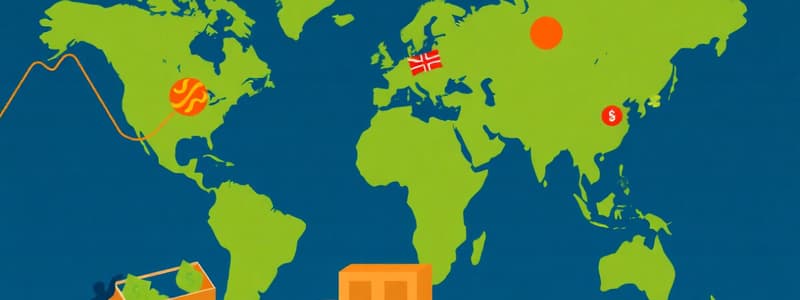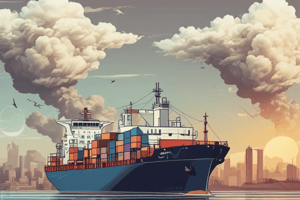Podcast
Questions and Answers
What is the global economy?
What is the global economy?
The exchange of goods and services integrated into a huge single global market.
What does the global economy consider?
What does the global economy consider?
The international exchange of goods and services that is expressed in monetary units of account.
What is the Great Depression?
What is the Great Depression?
The worst economic downturn in the history of the industrialized world that lasted from 1929 to 1939.
When was World War II?
When was World War II?
What is the Bretton Woods Conference officially known as?
What is the Bretton Woods Conference officially known as?
What was the IMF's main goal?
What was the IMF's main goal?
What does the World Bank promote?
What does the World Bank promote?
What is the WTO?
What is the WTO?
What was GATT?
What was GATT?
What is market integration?
What is market integration?
What is free trade?
What is free trade?
What is an embargo?
What is an embargo?
What are tariffs?
What are tariffs?
What are economic sanctions?
What are economic sanctions?
What are free trade areas?
What are free trade areas?
What is OECD?
What is OECD?
What is the interstate system?
What is the interstate system?
Flashcards
Global Economy
Global Economy
The exchange of goods and services integrated into a single huge global market, virtually a world without borders.
Great Depression
Great Depression
Worst economic downturn in the history of the industrialized world, lasted from 1929 to 1939.
World War II
World War II
A global war that lasted from 1939 to 1945. It worsened the Great Depression.
Bretton Woods Conference
Bretton Woods Conference
Signup and view all the flashcards
International Monetary Fund (IMF)
International Monetary Fund (IMF)
Signup and view all the flashcards
World Bank
World Bank
Signup and view all the flashcards
World Trade Organization (WTO)
World Trade Organization (WTO)
Signup and view all the flashcards
Market Integration
Market Integration
Signup and view all the flashcards
Free Trade
Free Trade
Signup and view all the flashcards
Economic Sanctions
Economic Sanctions
Signup and view all the flashcards
Study Notes
- GLOBAL ECONOMY refers to the exchange of goods and services integrated into a single global market, essentially a world without borders.
- It involves marketing individuals and companies conducting research, development, and sales on a global scale.
- The global economy encompasses the international exchange of goods and services in monetary units.
- It includes the economic activities within and between countries, each with its own production, labor, financial markets, resources, and environment.
- The global economy considers all national economies as one interconnected system.
- GREAT DEPRESSION describes the worst economic downturn in industrialized history, lasting from 1929 to 1939.
- WORLD WAR II was a global war from 1939 to 1945 that worsened the Great Depression.
- BRETTON WOODS CONFERENCE, or the United Nations Monetary and Financial Conference, involved 44 nations meeting from July 1-22, 1944, in Bretton Woods, New Hampshire.
- The aim was to establish new rules for the post-World War II international monetary system.
- The Philippine representatives at the Bretton Woods Conference included:
- President Manuel L. Quezon appointed Hon. Andres Soriano, Secretary of Finance and Chairman
- Hon. Jaime Hernandez, Auditor-General
- Mr. Joseph A. Foley, Manager of the Philippine National Bank, N. Y. Agency
- Mr. Ismael Mathay, Technical Assistant to the Auditor-General, served as Secretary to the delegation.
- BRETTON WOODS SYSTEM emerged because major world economies suffered from World War I, the Great Depression, and World War II.
- There was a fear of lacking cooperation among nation-states, political instability, and economic turmoil after World War II.
- The focus shifted to reducing trade barriers and enabling the free flow of money to restructure the world economy and ensure global financial stability.
- The IMF's primary goal was to assist countries in financial trouble that couldn't obtain money otherwise, acting as a lender of last resort.
- WORLD BANK promotes long-term economic development and poverty reduction by providing technical and financial support for reforms or projects like:
- Building schools
- Providing water and electricity
- Fighting disease
- Protecting the environment
- WORLD TRADE ORGANIZATION (WTO) is an independent multilateral organization responsible for trade in services, non-tariff barriers, and trade liberalization.
- The WTO addresses differences in national regulations on manufactured goods or food, intervening if regulations unfairly restrain trade.
- GATT was a forum for representatives from 23 member countries to discuss trade goods through multinational agreements.
- The Uruguay Round (1986-1993) resulted in an agreement to create the World Trade Organization (WTO).
- MARKET INTEGRATION means separate markets for the same product become one single market, such as when an import tax is removed.
- FREE TRADE involves international trade (import and export) without tariffs and non-tariff barriers like quotas, embargoes, or sanctions.
- EMBARGO is a government-imposed prevention of exports to a specific country, representing an official trade ban.
- ECONOMIC SANCTIONS are commercial and financial penalties one or more countries apply against a targeted country, group, or individual.
- FREE TRADE AREAS consist of groups of countries that abolish tariffs and non-tariff trade barriers among members but lack a common trade policy toward non-members.
- Free trade areas create exclusivity among members.
- OECD (Organization for Economic Cooperation and Development) includes 38 member states as of 2023 and serves as a club for the richest countries.
- The OECD's influence stems from its member countries' resources and economic power, despite its limited formal power.
- It helps governments compare experiences, address common challenges, identify good practices, and develop high standards for economic policy.
- INTERSTATE SYSTEM refers to the modern world-system structured politically as a system of competing and allying states.
- Political scientists often refer to this as the international system.
Causes of Depression:
- Overproduction
- High demand and prices during WWI
- Demand and prices falling after the war
- Farmers unable to repay loans
- Decrease in consumer spending
- Rising prices, low wages
- Overbuying on credit
- Uneven distribution of income
Key Elements of Bretton Woods System:
- Currency is expressed in terms of gold value to establish a par value.
- Each country's monetary authority agrees to exchange its currency for others at established rates, plus or minus a one-percent margin.
- The International Monetary Fund (IMF) was founded to oversee exchange rates.
- U.S. dollar became the global currency.
Institutions Created During Bretton Woods System:
- International Monetary Fund
- World Bank
- General Agreement on Tariffs and Trade
World's Major Free Trade Areas:
- North American Free Trade Agreement (NAFTA)
- Association of Southeast Asian Nations Free Trade Area (AFTA)
- Southern Common Market (MERCOSUR)
- Common Market of Eastern and Southern Africa (COMESA)
Not Free Trade Areas:
- European Union
- Trans-Pacific Partnership
- Transatlantic Trade and Investment Partnership – not yet ratified
Studying That Suits You
Use AI to generate personalized quizzes and flashcards to suit your learning preferences.




